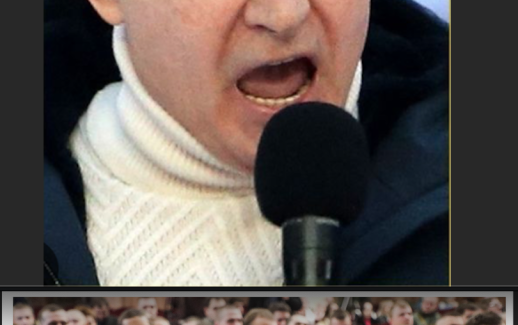U.S.-China Relations: Corrosive Effects of China’s National Intelligence Law
Thaw Sought: National Security Advisor Jake Sullivan has wrapped-up his August visit to China to try to find grounds for resolving gridlocked issues in U.S.-Chinese relations. One of those that may not have come up is China’s economically and geopolitically destabilizing 2017 National Intelligence Law (NIL17).
Problem: NIL17 requires Chinese expats and citizens to aid Chinese intelligence agencies in espionage and operations work abroad while communist party loyalty policy forces party members to propagandize for China. Thus, China’s NIL17 and loyalty policies undermine the mutual trust, economic benefit, respect, and security China repeatedly says it wants in its relations with the United States.
NIL17 and the loyalty law open a pandora’s box of national security, safety, legal, freedom, trust, unregulated influence, and anti-liberty issues for Chinese expats and their free nation hosts in the United States. The pressure can be acute when the Xi government leverages Chinese expats with implied negative outcomes for their families if they do not obey NIL17.
Illustrative National Security Case Discussion: This short dispatch focuses on an evolving national security incident and case that illustrates NIL17’s corrosive effects on the US-China relationship, and on US national security.
The case arose incidental to a City of Reedley, California code enforcement officer, Jesalyn Harper walking in on an illicit, makeshift, Chinese-owned bio-lab operation in a warehouse employing Chinese expats without legal state permits for such a laboratory. The code enforcement officer had reported finding ‘dozens of refrigerators and ultra low-temperature freezers hooked to illegal wiring; vials of blood and jars of urine in shelves and plastic containers; and about 1,000 white lab mice being kept in crowded, soiled containers.’
The bio lab reportedly made and shipped pregnancy and COVID-19 testing kits under the business names Universal Meditech Incorporated (UMI) and Prestige Biotech Incorporated (PBI). However, the businesses’ owner Jia Bei Zhu is now under federal criminal indictment for mislabeling, adulteration, fraud, conspiracy, and lying to FDA agents. Zhu and his slew of companies in Canada had reportedly faced a $330 million dollar judgment in Canada for theft of US intellectual property after which Zhu allegedly committed contempt of court and fled to the United States using the name “David He.”
About two months after Reedley city officials contacted the CDC, FBI, and their Senator, CDC personnel reportedly inspected the Reedley, California bio lab in March 2023. In August 2023, the Associated Press reported on the March 2023 CDC inspection findings:
During the March inspection of the makeshift bio-lab in Reedley, a city of about 25,000 people some 200 miles (320 kilometers) southeast of San Francisco, officials did find infectious agents in the refrigerators including E. coli, coronavirus, malaria, hepatitis B and C, dengue, chlamydia, human herpes, rubella and HIV.. and that ‘there was no sign that the lab was illegally in possession of the materials or had select agents or toxins that could be used as bioweapons.’
The CDC’s word “including” seems to have implied that there were more bio-agents than referenced. CDC’s findings without testing the vials and recommendation to destroy the warehouse’s contents prompted a US House Committee inquiry. The House Committee’s report suggested that the CDC’s assertion after its March inspection that there was “no sign that the lab was illegally in possession of the materials or had select agents or toxins that could be used as bioweapons,” was partially because CDC ‘refused to test a number of unlabeled vials, along with a fridge labeled “Ebola,” the contents of which were destroyed before their exact content could be ascertained.’
If the House report’s findings are true and contextually sound that the CDC did not test or secure for expert testing the infectious disease materials found inside the Reedley area bio lab, it seems to cast doubt on the CDC’s transparency in its public characterizations of its inspection of the bio lab. However, it is possible that CDC estimated that it would be more dangerous to test than to destroy the alleged bio-agents. Testing them might either lead to a virulent pandemic escape, war, or wasted resources finding dummy substances, whereas destroying them might prevent all three possibilities while the case experience and modus of operations observed provides leads to detecting and thwarting other adversarial strategies and operations.
As politicized media, politician, and CDC agency narratives flew back and forth however, it seems few questioned the role of the international context quietly energizing the churn: Beijing’s NIL17 (2017 National Intelligence Law), which obligates Chinese nationals like the bio lab’s owner Jia Bei Zhu and his Chinese expat employees to aid Chinese ministries of intelligence, security, and the People’s Liberation Army intelligence branch. NIL17 does create plausible contextual suspicion supporting the House Subcommittee’s and City of Reedley’s calls for reform and further investigation of the case, yet it also suggests that there will be deterrent and escalation logic considerations for national security workforces to prioritize.
Indeed, Jia Bei Zhu, per the House Committee video overview reportedly made statements on Chinese social media site “We Chat” suggesting that he had been working against the West in his business activities, allegedly writing:
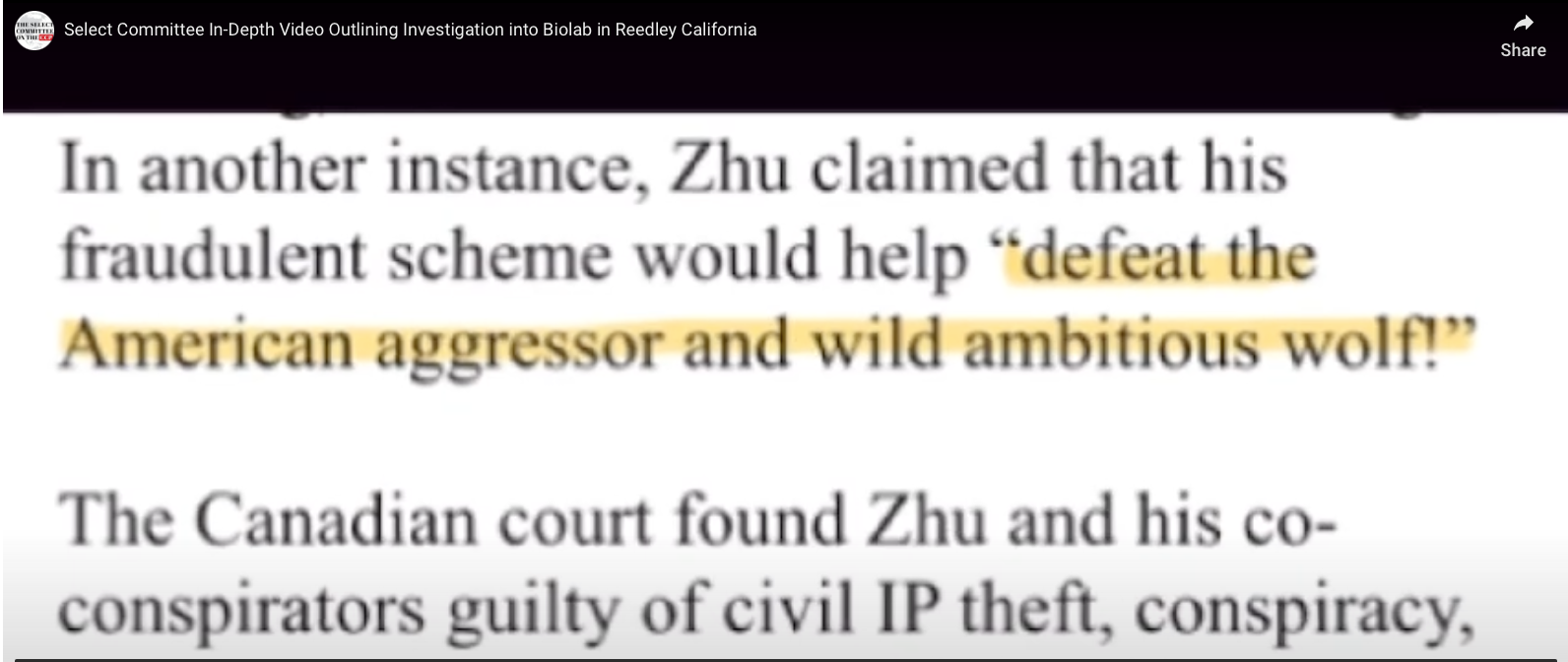
and
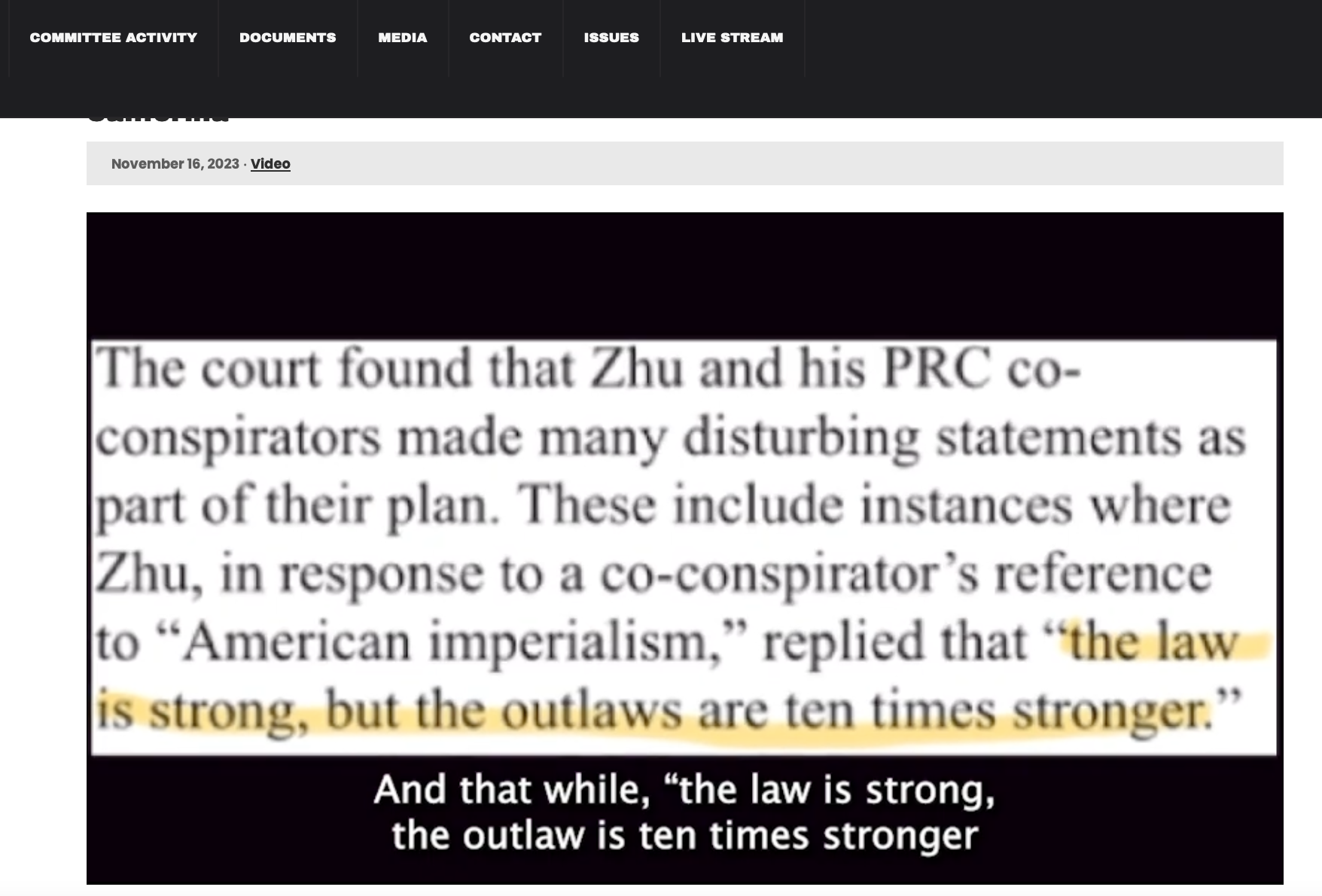
The above writings might suggest that Zhu was responding to the call of the NIL17 or the CCP loyalty policy, or wishing to signal that he was doing so with his activities. Or possibly, Zhu wanted Xi Jinping to consider him a loyal expat and work to secure his release once the law caught up with him. Either way, the NIL17 creates a context and incentive for nationalistic activity for expats abroad of a mind to seek advantages and support from Beijing.
The bio lab near Reedley, California was ostensibly a civilian test kit business, however, given City of Reedley, CDC, and House Select Committee on the Chinese Communist Party findings, the bio-agents that its labels indicated were present went far beyond civilian business use. This raised the issue of a potentially dual-use, civilian-military facility making revenues from selling adulterated pregnancy and COVID-19 test kits to provide state-deniable private commercial and criminal revenues to support contingent militarization of biological agents stored in the US under the auspices of a civilian business.
The House Committee also uncovered what it characterized as wire transfers of some 2 million dollars from China to Zhu, increasing chances that Beijing could not fail to know about such wire transfers in and out of the Great Firewall, nor to understand what Zhu was up to given Zhu’s apparent officer roles in what the House Committee characterized as joint civilian-military fusion companies in China. First the wire transfer documents below, then that of joint civilian-military fusion experience in Zhu’s background:
Wire Transfers
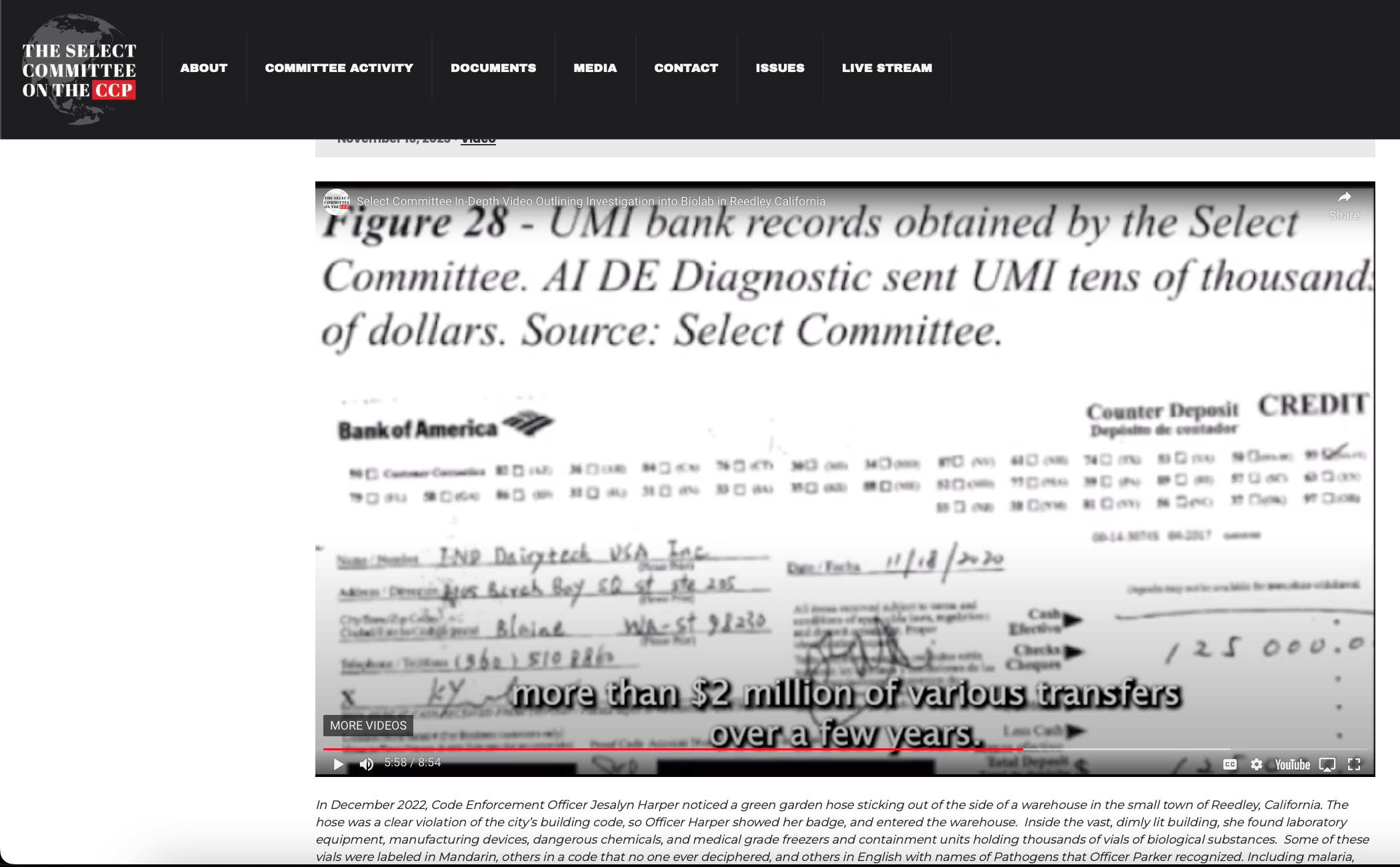
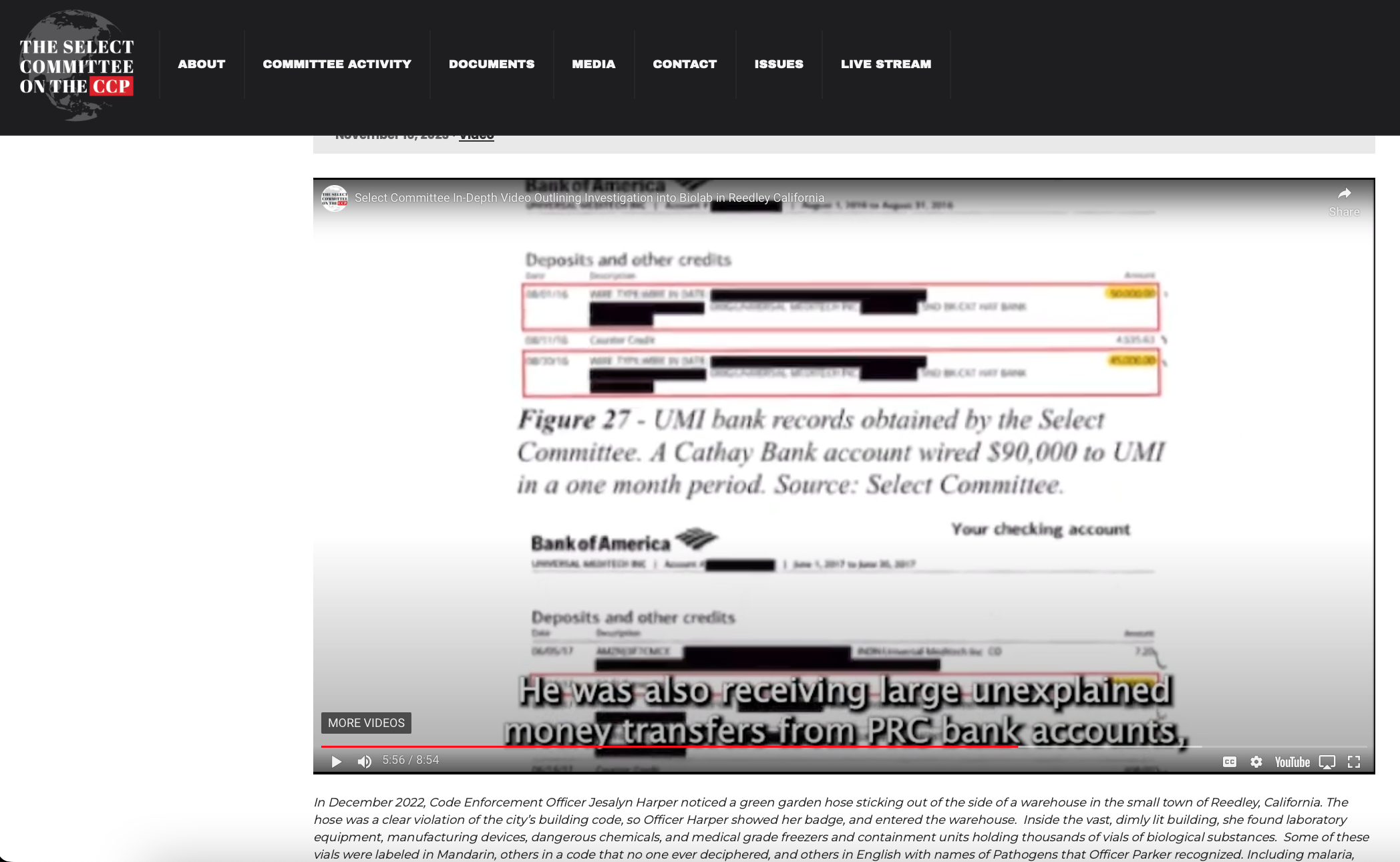
Zhu’s Background with Civilian-Military Fusion Entities:
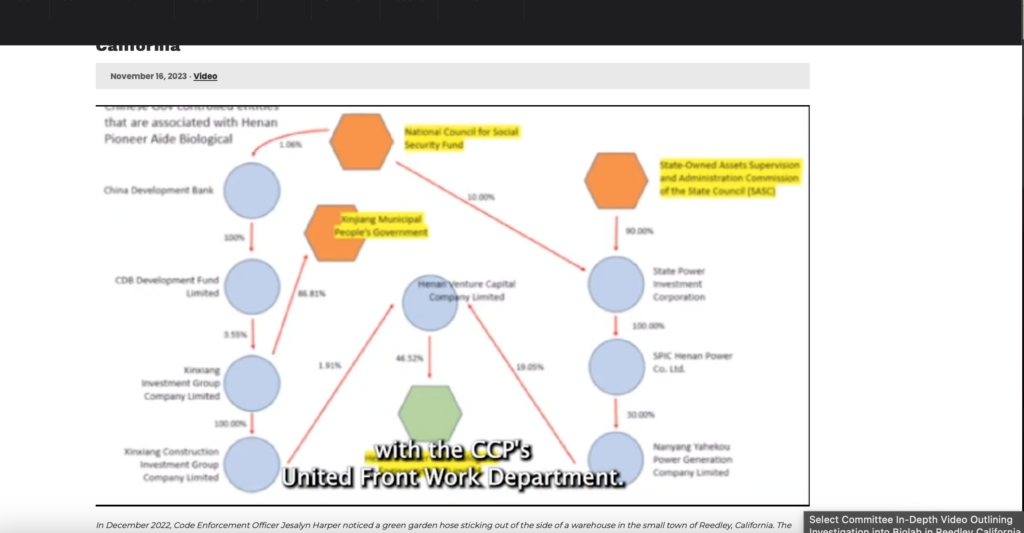

Conceptually, militarization of the Reedley facility would likely have involved simple yet very risky additions to its test kit ‘business’ such as CRISPR gene-editing kits and visiting personnel trained and qualified to design, modify, alter, prepare and or deploy the work product of those kits in the event of a China-US conflict. The idea that Beijing would put such a risky operation into the hands of someone like Zhu is hard to believe.
If the disease agents stored in the freezers and refrigerators were as-marked, and others unmarked to keep their nature a secret, it is possible that some modification of the bio-agents had already been done, but again, is China’s intelligence apparatus so desperate as to run a biowarfare operation this way? This may be another reason why the CDC left the cache of biological materials to court ordered destruction of the lab’s contents rather than either risk their escape or waste resources in an effort to transport, process, test, handle, and dispose of them.
As implied by China’s NIL17 legal requirements that Chinese expats work for the government’s security entities, Beijing’s pressure on expats, illicit companies in Canada and the US, and inducement of their cooperation with substantial sums of laundered funds sent by wire transfer to men like Zhu, is not so far fetched. But would Beijing risk starting a major war by entrusting biological weapons of mass destruction to a loose operation such as Zhu’s and to a person such as Zhu, with a major Canadian judgment against him?
If the Reedley warehouse operation had the potential for dual use (civilian / military) infectious disease development, it explains one likely reason it flew covertly under the radar without permits. However, it was discovered, highly sensitive operations would not normally be so easily discovered, and it isn’t certain if the bio-agents were real as they were not apparently tested by CDC. These thoughts suggest Zhu’s operation was more likely decoy, distraction, and psychological operations activity if backed by Beijing.
Should the bio-agents labeled have been counterfeits, then it is almost certain their existence in Reedley, if known to Chinese authorities, would be more likely a psychologically weaponized message to scare or deter Americans from defending Taiwan, challenging the PLAN in the South China Sea, or otherwise opposing China’s more muscular foreign policy going forward.
As such, Prestige Biotech, Inc., if known to the Chinese government, might have been intended to present a psychological threat analogy to China’s manufacturers that ship dual use technology to Russia that Moscow weaponizes against Ukrainians; or to sovereign Chinese chemical companies’ shipping of supposed civilian component chemicals for fentanyl production to drug cartels in the Western Hemisphere causing mass death in the US. These deniable, gray warfare actions and preparations are potentially destabilizing and potentially escalatory. Their existence tends to show that the imposition and offer of NIL17 involvement to Chinese expats meant business.
A side-issue of concern somewhat countervailing the above is that it appears the CDC took about two months to get out and inspect the illicit lab in March 2023 after it was discovered in December 2022. And as noted above, CDC announced after inspection that ‘there was no sign that the lab was illegally in possession of the materials or had select agents or toxins that could be used as bioweapons.’ Unless federal, state, and city authorities had seized and inventoried the contents of the bio lab in December or January 2022, the Chinese entity likely had ample time to remove whatever it wanted from its facility before the official CDC inspection, a concerning point. That said, reportedly, no weaponized agents were reportedly found in environmental testing at and surrounding the bio lab site, and it is possible Zhu was a known entity not taken seriously from the start.
The behaviors of Prestige Biotech, Inc. and its expat employees were oddly and unnecessarily provocative with discoverable appearances of bold wrongdoing and risk if there was no actual intention to do anything nefarious. The women working at the warehouse had told the code enforcement officer Jesalyn Harper to leave after openly disclosing their Chinese national ID and that of the owner. This open and obvious approach increases the possibility that Beijing was using Prestige via its NIL to send a psychological shot over the bow of the US while trying to entangle and confuse US national security efforts against China’s HUMINT operations inside the US.
Decoys, Accidental Decoys, and Information Warfare
The Reedley area bio lab, even if not militarized for present kinetic warfare, could be used for three sub-kinetic or gray warfare uses: psychological, political, and decoy warfare, each aimed at damaging United States security, freedom, will power, and political legitimacy if possible to win Beijing’s objectives without kinetic warfare. And then there is adaptability and extreme whipsawing contingencies, whereby an operation seemingly far fetched could be adapted to suddenly become a threat. This is a strategically-oriented tactic of keeping one’s competitor off balance that should not cause US national security personnel to utterly write-off reserved exceptions to unlikely resource commitment by Chinese intelligence. Sometimes great powers do become desperate when US intelligence does not know it if the surprise breakup of the Soviet Union was instructive.
Also, in recent history there may have been precedent for sub-kinetic use of decoy activity to tempt erroneous investigations of suspect Chinese expats or first generation citizens as publicized about espionage cases under the 2018 Trump DOJ’s “China Initiative” that raised a McCarthyist chill for some scientists of Chinese descent. This on a smaller scale brought to mind 1950s Senator Joseph McCarthy’s Red Scare tactics as would suit China’s and Russia’s information warfare objectives for the global image of the United States today.
Also, decoy operations that go nowhere would entangle US national security and counterintelligence workforces in frustrating, wasteful cases that Beijing would hope would prompt more conservative national security work at a time China wishes to soon become more aggressive. From such a decoy perspective, Prestige Biotech’s owner could also have been tasked with behaving badly in obvious ways in Canada and the US to entangle US national security workforces while attracting and dividing official attention from more subtle expat or proxy intelligence operations elsewhere.
Some decoy operations could also be undertaken to try to overwhelm and fatigue investigators with waves of dead end reports that go nowhere as a deliberate strategy of junk-case frequency to divert energies from higher-yield Chinese or Chinese-Russian operations. This, and the janky, public nature of Zhu’s operations could be one explanation why the FBI seemed to pass on investigating the Reedley case in depth, leaving enforcement to the FDA and others.
Still, recalling 9-11 a troubling aspect of deliberate decoying is that it drives-up the “cry wolf” risk. The costs to one’s opposing security forces and the tempted cynicism, uncertainty, and errors can hurt investigator morale force errors from national security workforces. This, while actual bio, nerve, or clandestine militarized drone production activities might be taking place off-of, or in the middle of some over-beaten path inside or over the border from the CONUS.
There will also be accidental decoying in which good intentioned expats pursue careers making them useful and necessary in the United States in hopes of securing a life here, while fleeing the Chinese dictatorship. However, these efforts may raise flags because these Chinese expats may rise within proximity to innovation, security, political, intelligence or defense roles and or related industrial positions, raising suspicion and soaking up resources if they are errantly investigated.
These movements and more may be anticipated within the purpose of NIL17 by which creative operations at whole-of-society scale among Chinese citizens and expats aim to wear down US defense, security, and freedom-protecting resources over time.
Parting Thoughts on Handling Expat Agents, Decoys, and Accidental Decoys
It is essential for US national security agents and analysts to be as clear, complete, specific, and honest about what is known and not known in handling reports of Chinese intelligence or military activities as possible. The NIL17 bias is to require, force, or coerce Chinese expats and guests abroad to work for Beijing, so those who do so may not be well-trained in intelligence disciplines. Many may have formed affinities for their new homes outside China and their reticence will show and be subject to reversal by sensitive, free nation outreach in a spirit of assistance.
Suspicion can create what it fears by offending or frightening expats who might never have intended to give into pressure from Beijing to spy on the U.S. These would be the accidental decoys.
And sometimes, if poorly treated with loss of face some expats may turn and serve Beijing out of anger and spite after all. A siege-mentality among expats inside their host country would be a loss to national security efforts. Mistreating expats may also do more to confirm in expats’ minds years of communist propaganda about the US that decades of communist speeches and The People’s Daily could not achieve alone.
To prevent alienation of Chinese expats while maintaining a robust national security program against Chinese spying, unrestricted gray warfare, hacking, infrastructure cyber warfare, and more, the United States needs a reinvigorated HUMINT program with substantial open and closed-source contextual data research and analysis to help intelligence operatives and analysts check contexts surrounding their subjects, objects, information bases, and operations.
Moreover, whole-of-society security responses calling for partnerships across sectors in the United States as set forth by FBI Director Christopher Wray can lead to trickle-down training of American citizens on how to spot likely foreign intelligence activity, narratives, approaches, infiltrates, illegals, proxies, and operational patterns. Teaching responsible context checking of perceptions to determine if “seeing something” means one should “say something” would be an art worth learning within the critical thinking enterprise across educational platforms of all kinds.
Note: While these general suggestions are not highly unique, they are not intended to be in a public source such as this. New ideas for national security effectiveness are for offline consultation.
